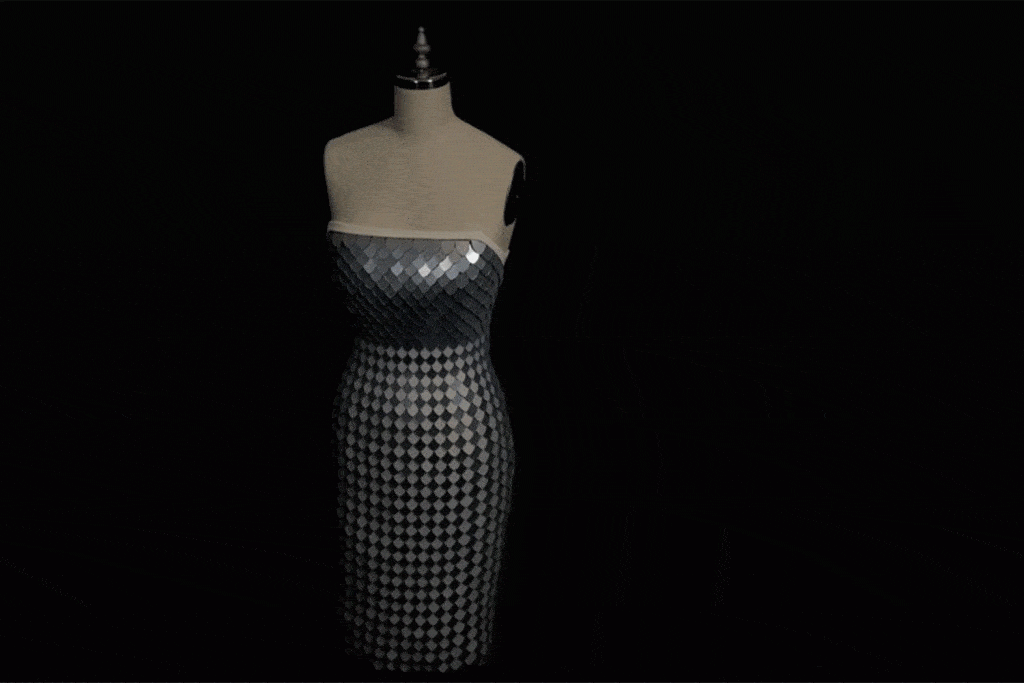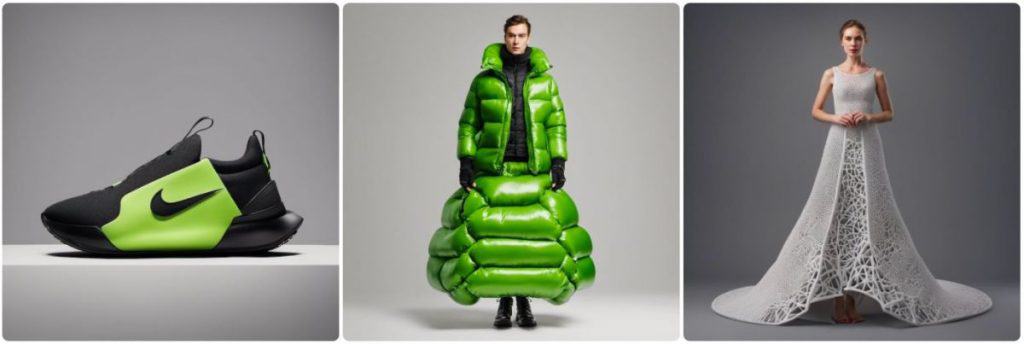Adobe’s Project Primrose Paves the Way for Fashion’s AI-Driven Future


In Brief
Generative AI is revolutionizing fashion, from interactive dresses like Adobe’s Project Primrose to apps creating infinite designs and styling options.
Adobe’s Project Primrose showcases AI’s potential in fashion. While the technology has limitations, it hints at the industry’s future possibilities.

Generative AI is transforming creative industries, with the fashion sector at the forefront of innovation. Recently, Adobe wowed audiences at its annual conference with Project Primrose, a sparkly silver interactive dress that utilizes generative AI to change its fabric pattern, colors and style in real-time. Despite its imperfections, the prototype dress represents a significant milestone in futuristic fashion.
Adobe’s Project Primrose aims to develop a dress that is “wearable, versatile, and easily adjustable,” catering to the needs of content creators and designers during the design phase. Project Primrose incorporates non-emissive fabrics capable of showcasing content generated through Adobe applications. These designs can remain static or animated and are controlled through a button interface.
In addition, the dress incorporates embedded sensors that can react to the wearer’s movements. Designers have the option to utilize Adobe’s creative AI tools for generating imagery based on textual prompts.
“Project Primrose, displayed at MAX as an interactive dress, makes this possible with wearable and flexible, non-emissive textiles which allow an entire surface to display content created with Adobe Firefly, Adobe After Effects, Adobe Stock and Adobe Illustrator,” Adobe wrote. “Designers can layer this technology into clothing, furniture, and other surfaces to unlock infinite style possibilities – such as the ability to download and wear the latest design from a favorite designer.”

Although it’s a promising first step, the dress’s limitations, like a limited color range and potential usability issues, have some industry experts questioning its viability. According to Vogue Business, critics argue that such innovations often remain at the prototype stage, failing to scale or fulfill their potential.
Nonetheless, the dress is marking the initial step in defining the future of AI-enhanced fashion. While the Adobe team is eager to innovate further, they acknowledge that it’s early days for this technology. Regardless of its scalability, Project Primrose has undoubtedly ignited a conversation about the possibilities and challenges of fashion.
AI Promises to Create an Infinity Number of Outfit Designs
From converting sketches and descriptions into high-fidelity designs to customizing products for individual consumers at scale, AI-powered technology is shaping the future of fashion.
Empowered by generative AI, creative directors and design teams can now collaborate, fostering innovation and generating diverse designs. These platforms enable designers to input their ideas, sketches, and preferences, resulting in a wealth of styles and options for each collection.
Moreover, facial recognition technology powered by generative AI can create personalized products, such as eyeglasses, by scanning facial topography and adjusting for size and style preferences.
AI-generated clothing apps, such as Resleeve and The New Black, have already made their mark in the fashion industry, offering innovative solutions that generate clothing designs using artificial intelligence.
These apps allow fashion enthusiasts to express their creativity simply by describing their concepts. What sets this technology apart is its ability to ensure that each design remains utterly unique, avoiding repetition.


AI tools can offer a intriguing creative process, enabling users to copy settings from other designs to generate their own variations in seconds, thanks to the collective intelligence of the AI community. Alternatively, designers can upload low-quality design photos and convert them into high-definition images.
Generative AI can also empower designers to generate realistic fashion designs and photoshoots instantly, creating entirely new and original product designs that meet market requirements in seconds.
Moreover, the technology can facilitate the transformation of sketches into high-quality product designs, saving time and resources while delighting customers. AI also allows designers to make additions and improvements to their designs and images through simple text prompts, streamlining the creative process.
Certain applications can take cues from mood boards, producing photorealistic fashion designs that capture the essence of the mood and style they draw inspiration from. Moreover, there is a growing trend in the industry toward generating professional fashion photoshoots and product catalog images, providing flexibility in models, settings and clothing items.
Generative AI plays a role in expediting the fashion design process and igniting unique creative possibilities, all while offering a more sustainable and efficient approach to fashion innovation. The intersection of artificial intelligence and fashion is undeniably influencing the industry’s trajectory.
Disclaimer
In line with the Trust Project guidelines, please note that the information provided on this page is not intended to be and should not be interpreted as legal, tax, investment, financial, or any other form of advice. It is important to only invest what you can afford to lose and to seek independent financial advice if you have any doubts. For further information, we suggest referring to the terms and conditions as well as the help and support pages provided by the issuer or advertiser. MetaversePost is committed to accurate, unbiased reporting, but market conditions are subject to change without notice.
About The Author
Agne is a journalist who covers the latest trends and developments in the metaverse, AI, and Web3 industries for the Metaverse Post. Her passion for storytelling has led her to conduct numerous interviews with experts in these fields, always seeking to uncover exciting and engaging stories. Agne holds a Bachelor’s degree in literature and has an extensive background in writing about a wide range of topics including travel, art, and culture. She has also volunteered as an editor for the animal rights organization, where she helped raise awareness about animal welfare issues. Contact her on agnec@mpost.io.
More articles

Agne is a journalist who covers the latest trends and developments in the metaverse, AI, and Web3 industries for the Metaverse Post. Her passion for storytelling has led her to conduct numerous interviews with experts in these fields, always seeking to uncover exciting and engaging stories. Agne holds a Bachelor’s degree in literature and has an extensive background in writing about a wide range of topics including travel, art, and culture. She has also volunteered as an editor for the animal rights organization, where she helped raise awareness about animal welfare issues. Contact her on agnec@mpost.io.





















































